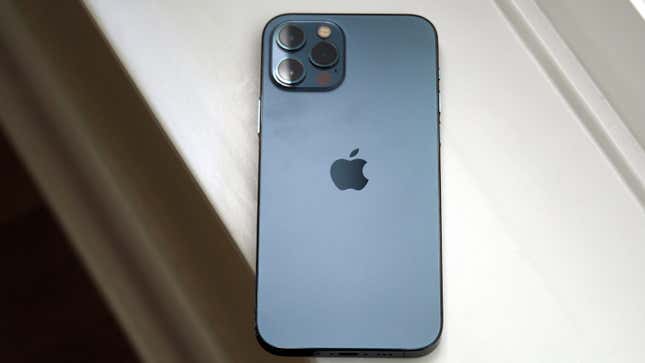
Apple’s new Private Relay feature for iPhones isn’t sitting well with carriers, and some operators are doing all they can to squash the privacy setting before it reaches your iPhone.
Announced at last year’s WWDC, Private Relay is a new iCloud+ feature that pushes your web traffic requests through encrypted VPN-like filters so nobody—not even Apple—can see your internet traffic. It crucially protects you from ISPs or websites that might use your DNS records and IP address to generate profiles and serve targeted ads.
Instead of tunneling your data like a VPN, Private Relay encrypts your data before passing it through an Apple-managed proxy server that decouples the DNS request from your IP address then moves it on to an undisclosed “trusted partner” that uses a fake approximate IP address. While it has several limitations—the feature only works in Safari, you need a paid iCloud+ account, and it doesn’t hide your region—Private Relay is generally regarded as a useful privacy tool, if short of being a full VPN.
According to a report from The Telegraph, European carriers are bricking the feature. An open letter (via a report from The Telegraph) signed by carrier giants Vodafone, Telefonica, and T-Mobile claims Apple’s new privacy feature would hinder their ability to manage networks and infringes upon EU “digital sovereignty.”
“The way private relay is implemented will have significant consequences in terms of undermining European digital sovereignty. Furthermore, private relay will impair others to innovate and compete in downstream digital markets and may negatively impact operators’ ability to efficiently manage telecommunication networks,” the letter reads.
Operators are expecting the European Commission to label Apple a “digital gatekeeper,” a title the report claims could “stop services such as private relay.”
There are also reports going around suggesting T-Mobile/Sprint in the United States is blocking Private Relay when your phone is connected to its mobile network, but that might be a simplification of what’s really going on.
Twitter user Jon Guidry (via 9to5Mac), a T-Mobile customer, attempted to enable Private Relay but was instead greeted with a notice explaining the feature was “turned off for your cellular plan” and warning the network can therefore monitor him.
Some news outlets proposed T-Mobile’s network might be slowly rolling this feature out, which would explain why some customers can still enable Private Relay. However, leaked documents published by The T-Mo Report showed that customers with certain content filtering and blocking features, like T-Mobile’s Web Guard, can’t access Private Relay.
T-Mobile later confirmed to Gizmodo that customers with certain content filtering plans can’t access Private Relay because it prevents those carrier features from working properly. It later determined that “some device settings” in iOS 15.2 default to the feature being toggled off. The carrier says it told Apple about the behavior and reiterated that it has not “broadly blocked” iCloud Private Relay.
“Customers who chose plans and features with content filtering (e.g. parent controls) do not have access to the iCloud Private Relay to allow these services to work as designed. All other customers have no restrictions,” a T-Mobile representative wrote in an email.
Private Relay is currently in public beta in iOS 15, iPadOS 15, and macOS Monterey. The feature is turned off by default and must be manually enabled within Settings.
Update on Jan 11 at 2:50pm E.T: After releasing a statement confirming that the feature isn’t available for customers who are signed up to certain content filtering plans, T-Mobile told Gizmodo in an email that it discovered in iOS 15.2 that “some device settings default to the feature being toggled off.” The company says it shared the findings with Apple and reiterated that it did not block iCloud Private Relay.